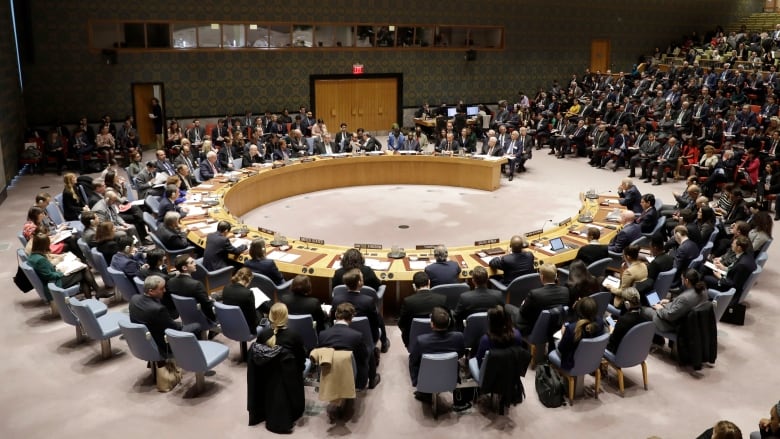Morals? Ethics? No Sacrifice if They're Absent To Begin With
"They don't understand why this council is unable to stop the carnage amongst a civilian population trapped in a war zone."
"Their message to you is essentially the same one I relayed when I briefed you on 30 July:'We are afraid. Please help us. Make it stop'."
"When will the carnage stop? I have briefed the UN Security Council month after month on the consequences of inaction."
"Since last summer we have seen deadlock and division. Calamity can only be avoided if Security Council members, and those with influence, overcome individual interests and put a collective stake in humanity first. That requires difficult decisions, especially from council members with veto powers. The parties to the conflict have a legal and moral responsibility to respect international humanitarian law."
Mark Lowcock, undersecretary-general for humanitarian affairs, United Nations
 |
| The UN Security Council meets to discuss the Palestinian situation at United Nations headquarters on Tuesday, Feb. 11, 2020. (Seth Wenig/The Associated Press) |
When Pierre-Elliott Trudeau prepared to leave office after his second and final mandate as Canada's Prime Minister, he sought a legacy toward which he launched himself on a whirlwind international tour extolling world peace and his intention to be seen as an integral mover in his determination to launch global momentum to achieving that monumental goal. World peace, disarmament, and reconciliation between first-world and third-world governments were his focus as he travelled to Europe, Asia and the U.S. to sell his vision.
His son and prime ministerial successor Justin, currently in his second term as prime minister of Canada is also extensively travelled. His focus is somewhat less ambitious and certainly less honourable; he wants to be known as the man who brought Canada 'back' to the United Nations, with a coveted seat at the United Nations revolving temporary, two-year, ten-member Security Council. Why this should be so is a puzzle to anyone who tracks the recent history of the United Nations, with its focus on condemning one country alone, out of its 193 member-nations.
 |
Russia, one of the permanently-seated members of the United Nations besides France, Britain, China and the United States, is currently embroiled in a long-running civil war in the Middle East, where it has been giving air cover to the troops of Syria's Bashar al-Assad, bombing civilian areas and countless hospitals, ostensibly to root out Islamist terrorists, in the process victimizing Syria's majority Sunni civilians, creating an immense refugee crisis of internally and externally displaced, representing half of Syria's population, millions desperately knocking at Europe's door for haven.
Justin Trudeau is so anxious to prevail in his bid for the one seat available for Europe and North America that he is competing against Ireland and Norway, by attending an African Union conference where he could confer with Africa's most brutal dictators and human rights abusers, offering Canadian financial largess in exchange for votes. In a recent session of the Security Council meeting over the Trump latest Middle East peace plan, he found himself in the precarious position of supporting the nay-sayers against both Canada's American neighbour and trade partner, and democratic Israel.
 |
| Prime Minister Justin Trudeau, centre right, takes part in an African Union high-level breakfast dialogue in Addis Ababa, Ethiopia on Monday, Feb. 10, 2020. (Sean Kilpatrick/The Canadian Press) |
Recently, Trudeau ordered his appointee at the United Nations to endorse a UN resolution sponsored by North Korea, Zimbabwe and the PLO -- one of 16 aimed to condemn Israel at the General Assembly that passes easily every year. Demonstrating no compunction in making common cause with failed states and brutal dictatorships in the greater interest of gaining influence over votes to be cast for election to that august body. Where Canada can sit among the world's worst human-rights oppressors in a dysfunctional chamber of international failure to achieve peace.
Where, throughout the world body, the majority of its members are complicit in human rights violations, representing corrupt governments where people live miserable lives of indigent need, oppression and tribal and sectarian conflict. Yet last year, a total of six resolutions were passed in the General Assembly against member-countries like Syria, responsible for slaughtering a half-million of its own people, and where China, imprisoning an estimated million Uyghurs was spared any embarrassment condemning its human rights record, but Israel was targeted with no fewer than 21 human rights resolutions.
 |
| THE CANADIAN PRESS/Adrian Wyld |
If Justin Trudeau has his way, Canada will sit alongside Ethiopia, a member of the Security Council which has refused to allow UN special rapporteurs on torture, freedom of opinion and expression, peaceful assembly and others access, according to a 2019 Human Rights Watch report. And then there is Senegal, where homosexuality remains punishable by up to five years in prison. In defence of criticism over his Africa foray, Trudeau assures his critics that discussions on human rights took place between himself and those he met; they took place -- in private.
Labels: Canada, Justin Trudeau, Morality, Obsession, United Nations Security Council
0 Comments:
Post a Comment
<< Home